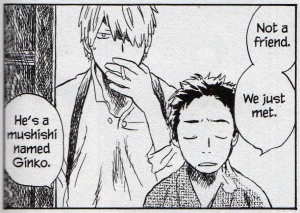 I’ll begin my look at this week’s ComicList with a request. If you’ve never actually read a volume of Natsuki Takaya’s Fruits Basket (Tokyopop), which concludes with its 23rd volume, I beg you to refrain from writing about the mega-hit in condescending, reductive terms. It’s not a cutesy romantic fantasy about people who turn into animals, or at least it hasn’t been since maybe its second or third volume. It’s actually a crushingly effective drama about breaking a generational cycle of emotional abuse and neglect, and it’s one of a very small handful of comics that has ever made me cry. It’s also a rare example of an extremely popular comic also being an absolutely brilliant comic, so in deference to the people who are going to miss new volumes rather terribly, please don’t call it “fluffy” or something equally inane.
I’ll begin my look at this week’s ComicList with a request. If you’ve never actually read a volume of Natsuki Takaya’s Fruits Basket (Tokyopop), which concludes with its 23rd volume, I beg you to refrain from writing about the mega-hit in condescending, reductive terms. It’s not a cutesy romantic fantasy about people who turn into animals, or at least it hasn’t been since maybe its second or third volume. It’s actually a crushingly effective drama about breaking a generational cycle of emotional abuse and neglect, and it’s one of a very small handful of comics that has ever made me cry. It’s also a rare example of an extremely popular comic also being an absolutely brilliant comic, so in deference to the people who are going to miss new volumes rather terribly, please don’t call it “fluffy” or something equally inane.
 With that off my chest, I can look to the future, which includes a new series from Yuji Iwahara, Cat Paradise (Yen Press). CMX published Iwahara’s three-volume Chikyu Misaki, which still ranks for me as one of the most underappreciated manga ever to be published in English. It’s a terrific blend of fantasy and mystery with wonderful characters and unusual, eye-catching illustrations. Iwahara’s King of Thorn (Tokyopop), was less successful for me, though I found it to be a very competent survival drama. Of course, it was coming out at roughly the same time as Minetaro Mochizuki’s utterly genius survival drama, Dragon Head (Tokyopop), so it was bound to suffer in comparison. Anyway, Cat Paradise seems to be about students and their pets fighting against demonic forces or something like that, but describing Iwahara’s comics never really does them justice, and his work is always worth a look.
With that off my chest, I can look to the future, which includes a new series from Yuji Iwahara, Cat Paradise (Yen Press). CMX published Iwahara’s three-volume Chikyu Misaki, which still ranks for me as one of the most underappreciated manga ever to be published in English. It’s a terrific blend of fantasy and mystery with wonderful characters and unusual, eye-catching illustrations. Iwahara’s King of Thorn (Tokyopop), was less successful for me, though I found it to be a very competent survival drama. Of course, it was coming out at roughly the same time as Minetaro Mochizuki’s utterly genius survival drama, Dragon Head (Tokyopop), so it was bound to suffer in comparison. Anyway, Cat Paradise seems to be about students and their pets fighting against demonic forces or something like that, but describing Iwahara’s comics never really does them justice, and his work is always worth a look.
 I suspect the impact of its conclusion will be washed away in a sea of Fruits Basket tears, but I’ll also miss Kitchen Princess (Del Rey), written by Miyuki Kobayashi and illustrated by Natsumi Ando. It’s a cooking manga, which is enough to put it on my “read automatically” list, but it also became an increasingly effective melodrama as the series progressed. And there are recipes in the back. Try the Madeleine recipe. On the shônen front, Del Rey also offers a new volume of Hiro Mashima’s very entertaining Fairy Tail.
I suspect the impact of its conclusion will be washed away in a sea of Fruits Basket tears, but I’ll also miss Kitchen Princess (Del Rey), written by Miyuki Kobayashi and illustrated by Natsumi Ando. It’s a cooking manga, which is enough to put it on my “read automatically” list, but it also became an increasingly effective melodrama as the series progressed. And there are recipes in the back. Try the Madeleine recipe. On the shônen front, Del Rey also offers a new volume of Hiro Mashima’s very entertaining Fairy Tail.
It’s also Viz’s week to remind me that I really need to hunker down and catch up with some series that I like very much: Hideaki Sorachi’s Gin Tama, Kazune Kawahara’s High School Debut, Ai Yazawa’s Nana, and Yuki Obata’s We Were There. In my defense, Viz keeps publishing great new manga, particularly in its Signature line, so it’s becoming increasingly impractical to keep up with ongoing series.

 If you haven’t treated yourself to the first two volumes of Marguerite Abouet and Clément Oubrerie’s earthy, charming soap opera set in the Ivory Coast of the 1970s, then you should catch up, since the third,
If you haven’t treated yourself to the first two volumes of Marguerite Abouet and Clément Oubrerie’s earthy, charming soap opera set in the Ivory Coast of the 1970s, then you should catch up, since the third,  Top Shelf drops a massive omnibus, available in soft- and hardcover versions, of Eddie Campbells Alec comics, called
Top Shelf drops a massive omnibus, available in soft- and hardcover versions, of Eddie Campbells Alec comics, called  I saw this on Twitter yesterday, and there it is in the catalog. Viz releases two volumes of Inio (
I saw this on Twitter yesterday, and there it is in the catalog. Viz releases two volumes of Inio ( I automatically become nervous when buzz about a book reaches a certain pitch, so I’m glad I read a comp copy of David Small’s
I automatically become nervous when buzz about a book reaches a certain pitch, so I’m glad I read a comp copy of David Small’s  Last, but certainly not least, Yen Press brings boundless joy to the world (at least the world occupied by people with good taste) by releasing the sixth volume of Kiyohiko Azuma’s hilarious, completely endearing
Last, but certainly not least, Yen Press brings boundless joy to the world (at least the world occupied by people with good taste) by releasing the sixth volume of Kiyohiko Azuma’s hilarious, completely endearing  I can’t remember if it was in Mad or Cracked or Crazy, but many years ago there was a great parody of Casper, the Friendly Ghost called “
I can’t remember if it was in Mad or Cracked or Crazy, but many years ago there was a great parody of Casper, the Friendly Ghost called “ Updated: I almost never look at the Marvel section of the ComicList, so I missed the listing for the collection of the
Updated: I almost never look at the Marvel section of the ComicList, so I missed the listing for the collection of the  Well, for starters, there’s the third volume of Mi-Kyung Yun’s
Well, for starters, there’s the third volume of Mi-Kyung Yun’s  There are some debuts. I quite liked the first volume of Natsuna Kawase’s The Lapis Lazuli Crown (CMX), so I’ll certainly take a chance on
There are some debuts. I quite liked the first volume of Natsuna Kawase’s The Lapis Lazuli Crown (CMX), so I’ll certainly take a chance on  I’ve enjoyed Josh Neufeld’s travel comics, though he tends to go places I would never personally consider for a vacation. My idea of roughing it is hotels with limited room service. But his
I’ve enjoyed Josh Neufeld’s travel comics, though he tends to go places I would never personally consider for a vacation. My idea of roughing it is hotels with limited room service. But his 
 The most interesting thing about the first volume of Yuki Sato’s
The most interesting thing about the first volume of Yuki Sato’s  I’m always happy to see shôjo titles show up on bestseller lists, but I’m often puzzled by which ones earn that distinction.
I’m always happy to see shôjo titles show up on bestseller lists, but I’m often puzzled by which ones earn that distinction.  In
In  I was looking through the new
I was looking through the new  One of the books that’s gotten a lot of tweets lately is CMX’s
One of the books that’s gotten a lot of tweets lately is CMX’s